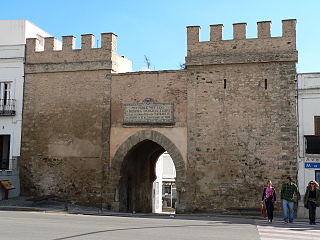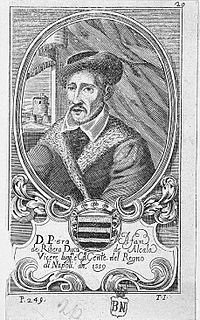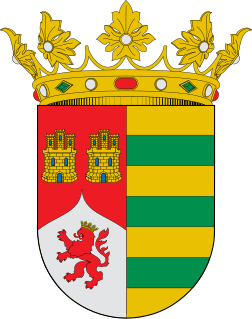
Cádiz is a province of southern Spain, in the southwestern part of the autonomous community of Andalusia. It is the southernmost part of mainland Spain, as well as the southernmost part of continental Europe.
San Jorge is Spanish for Saint George.

The Route of the Bull is a tourist trail in the province of Cádiz, Spain, that traverses the areas where fighting bulls are raised. These bulls, used in bullfights (corridas) throughout Spain, are of a breed native to Spain, a breed also appreciated for its beef. The Route of the Bull is meant to direct tourists through landscapes where it is possible to observe these totemic animals in their natural habitat, but the scenic beauty of the countryside, and the myriad points of historical and cultural interest along the way, make following the route worthwhile even for the visitor who finds the very notion of the bullfight off-putting.

La Janda is a comarca in the province of Cádiz, southern Spain.

Pedro III Fajardo de Zúñiga y Requesens was a Spanish soldier and aristocrat notable for his command of Spanish forces during the Catalan Revolt after 1640. He was Viceroy of Valencia, 1631–1635, Viceroy of Navarre, 1638–1640, Viceroy of Catalonia, 1640–1642, Spanish Ambassador to Rome, and Viceroy of Sicily, 1644-1647.

Juan Tomás Enríquez de Cabrera y Ponce de Leon, VII Duque de Medina de Río-Seco, was a Spanish noble and military.

Pedro Afán de Ribera, 1st Duke of Alcalá de los Gazules, Virrey y Capitán General de Cataluña y Nápoles, also known as Pedro Enriquez Afan de Ribera or Per Afán de Ribera y Portocarrero or Perafán de Ribera y Portocarrero, was a Spanish nobleman most notable for his twelve-year-long service as Viceroy of Naples, Viceroy of Cataluña and 1st Duke of Alcalá de los Gazules.
Fernando Enriquez de Ribera y de Moura, 6th Marquis of Tarifa (1614–1633), no issue, dead before his father, was the son of Fernando Enriquez de Ribera y Girón, 3rd duke of Alcalá de los Gazules, 5th Marquis of Tarifa, Viceroy of Sicily, 1632–1635, and Portuguese-Spanish Lady Beatriz de Moura y Corte-Real, daughter of Portuguese nobleman Cristóbal de Moura y Távora, a.k.a. Cristóvão de Moura, (1538–1613), 1st Marquess of Castelo Rodrigo, Viceroy of Portugal, 1603–1607, and a Grandee of Spain.

Luis Guillermo de Moncada y de Aragon y de la Cerda y de la Cueva was a Spanish nobleman and Roman Catholic cardinal. He was a Knight of the Military Order of Alcantara in 1630, Viceroy of Sicily in 1635, Captain General and Viceroy of Sardinia (1644), Viceroy of Valencia in 1652 and a Knight of the Order of the Golden Fleece in 1651.
Barbate Reservoir is a reservoir in Alcalá de los Gazules, province of Cádiz, Andalusia, Spain.
Fernando Afán de Ribera y Téllez-Girón was a Spanish noble and diplomat.

Juan Francisco de la Cerda Enríquez de Ribera, 8th Duke of Medinaceli, 7th Marquis de Cogolludo, 4th Marquis of Alcalá de la Alameda, 6th Duke of Alcalá de los Gazules, 9th Count of Los Molares, 9th Marquis of Tarifa, 8th Count of El Puerto de Santa María, was a Spanish noble and politician, and valido of King Charles II of Spain.

Luis Francisco de la Cerda y Aragón,, 9th Duke of Medinaceli, was a Spanish noble and politician.

The Church of San Jorge is a church located in Alcalá de los Gazules, Spain. It was declared Bien de Interés Cultural in 2006.

The Dukedom of Alcalá de los Gazules is a Spanish title of nobility established by order of King Philip II of Spain in 1558 and granted to Per Afán de Ribera y Portocarrero of the House of Ribera in recognition for services rendered to the crown. The title held dominion and lordship over what is roughly the area of Alcalá de los Gazules in the Province of Cádiz.
The Church of La Victoria or the Church of the Convent of San Francisco de Paula is a provincial Baroque-style, Roman Catholic church located on the street: Alameda de la Cruz of the town of Alcalá de los Gazules, province of Cádiz, autonomous community of Andalusia, Spain.

The Battle of Vega de Pagana was a battle between forces loyal to the King Alfonso XI of Castile against those mainly of the Maranid sultan Abu al-Hasan 'Ali of Morocco.















